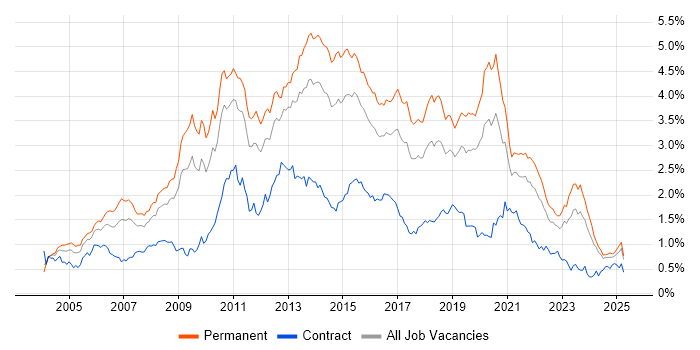Transact-SQL
England > Midlands
The table below provides summary statistics and salary benchmarking for jobs advertised in the Midlands requiring T-SQL skills. It covers permanent job vacancies from the 6 months leading up to 22 February 2026, with comparisons to the same periods in the previous two years.
| 6 months to 22 Feb 2026 |
Same period 2025 | Same period 2024 | |
|---|---|---|---|
| Rank | 184 | 174 | 132 |
| Rank change year-on-year | -10 | -42 | +73 |
| Permanent jobs citing T-SQL | 46 | 59 | 160 |
| As % of all permanent jobs in the Midlands | 0.51% | 1.01% | 1.88% |
| As % of the Programming Languages category | 3.62% | 3.74% | 6.23% |
| Number of salaries quoted | 43 | 32 | 146 |
| 10th Percentile | £28,000 | £39,000 | £36,500 |
| 25th Percentile | £41,250 | £41,250 | £46,250 |
| Median annual salary (50th Percentile) | £48,500 | £46,250 | £52,500 |
| Median % change year-on-year | +4.86% | -11.90% | +9.66% |
| 75th Percentile | £65,000 | £60,313 | £63,750 |
| 90th Percentile | £75,000 | £63,500 | £67,500 |
| England median annual salary | £48,500 | £55,000 | £55,000 |
| % change year-on-year | -11.82% | - | -0.90% |
All Programming Languages
Midlands
T-SQL falls under the Programming Languages category. For comparison with the information above, the following table provides summary statistics for all permanent job vacancies requiring coding skills in the Midlands.
| Permanent vacancies with a requirement for coding skills | 1,271 | 1,576 | 2,569 |
| As % of all permanent jobs advertised in the Midlands | 14.01% | 27.09% | 30.25% |
| Number of salaries quoted | 997 | 903 | 2,279 |
| 10th Percentile | £28,900 | £32,500 | £31,500 |
| 25th Percentile | £36,750 | £41,250 | £39,894 |
| Median annual salary (50th Percentile) | £50,000 | £52,500 | £50,000 |
| Median % change year-on-year | -4.76% | +5.00% | -9.09% |
| 75th Percentile | £67,250 | £65,000 | £63,750 |
| 90th Percentile | £80,000 | £74,144 | £72,500 |
| England median annual salary | £62,500 | £65,000 | £60,000 |
| % change year-on-year | -3.85% | +8.33% | -7.69% |
T-SQL
Job Vacancy Trend in the Midlands
Historical trend showing the proportion of permanent IT job postings citing T-SQL relative to all permanent IT jobs advertised in the Midlands.

T-SQL
Salary Trend in the Midlands
Salary distribution trend for jobs in the Midlands citing T-SQL.

T-SQL
Salary Histogram in the Midlands
Salary distribution for jobs citing T-SQL in the Midlands over the 6 months to 22 February 2026.
T-SQL
Job Locations in the Midlands
The table below looks at the demand and provides a guide to the median salaries quoted in IT jobs citing T-SQL within the Midlands region over the 6 months to 22 February 2026. The 'Rank Change' column provides an indication of the change in demand within each location based on the same 6 month period last year.
| Location | Rank Change on Same Period Last Year |
Matching Permanent IT Job Ads |
Median Salary Past 6 Months |
Median Salary % Change on Same Period Last Year |
Live Jobs |
|---|---|---|---|---|---|
| West Midlands | +14 | 29 | £42,500 | -22.73% | 11 |
| East Midlands | -32 | 17 | £50,000 | +11.11% | 7 |
| T-SQL England |
|||||
T-SQL
Co-Occurring Skills & Capabilities in the Midlands by Category
The following tables expand on the one above by listing co-occurrences grouped by category. They cover the same employment type, locality and period, with up to 20 co-occurrences shown in each category:
